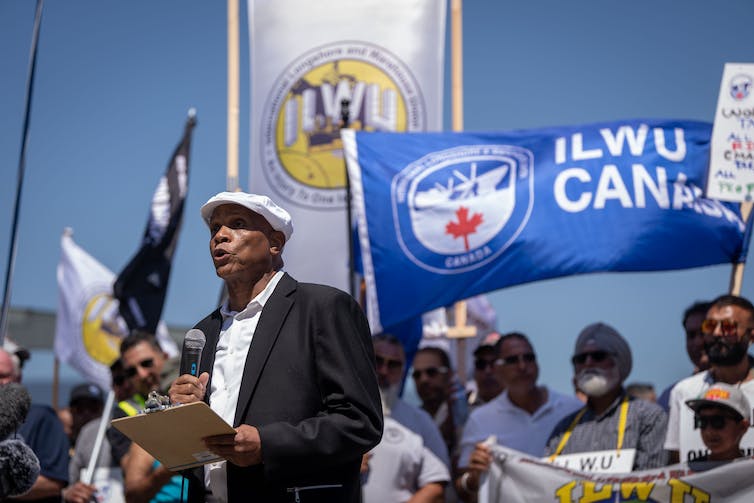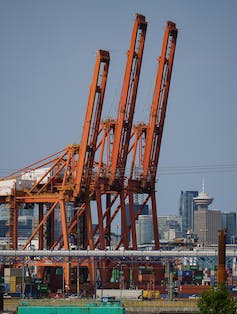B.C. labour dispute: It’s time for an industrial inquiry commission into ports and automation

Striking International Longshore and Warehouse Union Canada workers march to a rally as gantry cranes used to load and unload cargo containers from ships sit idle at port, in Vancouver, on July 6, 2023. THE CANADIAN PRESS/Darryl Dyck
A new tentative agreement was reached on July 30 between the two groups involved in a labour dispute affecting British Columbia ports with the help of the Industrial Relations Board.
At the beginning of July, about 7,400 port workers went on strike for 13 days over issues including automation, outside contracting and the increasing cost of living.
This new deal — between the International Longshore and Warehouse Union Canada (ILWU) and the B.C. Maritime Employers Association — comes after union members rejected a previous deal on July 28.
By initially rejecting the first contract, ILWU members implied that a generous wage and benefit package — which employers had agreed to pay — was not enough to address their concerns about potential job losses and workplace changes.
This isn’t a one-sided problem; under current workplace arrangements and labour market pressures, port operators are unlikely to attract and retain workers with the skills required to implement the coming automation.
With the prospect that the new container terminal at Roberts Bank port, south of Vancouver, will be the first fully automated terminal in B.C., this issue is more important than ever.
Canada Labour Code
After the initial deal between the union and the employer’s association was rejected, Labour Minister Seamus O’Regan asked the Canada Industrial Relations Board whether a negotiated resolution was still possible, and to impose a new collective agreement or binding arbitration if it was not.
Despite many people demanding back-to-work legislation, O’Regan followed the Canada Labour Code, which encourages free collective bargaining and advocates for the constructive settlement of disputes.
In support of the idea that negotiated settlements are best, the code provides the minister with tools to prod, push or force parties in an industrial dispute to find a deal they can both live with.

Willie Adams, International President of the International Longshore and Warehouse Union, speaks at a strike rally in Vancouver, on July 9, 2023.
THE CANADIAN PRESS/Ethan Cairns
Drawing on my research on B.C. ports, I’d encourage the minister to make use of one more tool provided in the code: appoint an industrial inquiry commission on port skills and automation.
Dockworkers and new technologies
To understand the current dispute, we need to overturn the myth that west coast unionized dockworkers have refused to accept new cargo handling technologies.
Since the 1960s, ports on the west coast of North America have benefited enormously from mechanization and modernization agreements, now enshrined in various collective agreements.
In exchange for giving employers the freedom to implement technological changes — which often displace labour — employees secured a share of the resulting productivity gains in some form of compensation.
In the United States, this takes the form of a minimum earnings guarantee; in B.C. ports, full members receive a generous payout at retirement.
But one result of a “jobs-for-income” agreement, in an industry where labour demand fluctuates, is a large pool of casual workers. As a result, not everyone working in B.C. ports is a full union member: roughly two-fifths are members, one-fifth are casuals with benefits and two-fifths are casuals without benefits.
The prospect of being a casual employee for several years is not particularly attractive, least of all to a tradesperson or computer programmer with employment options elsewhere.
Commissions have helped before

Gantry cranes used to load and unload cargo ships sit idle at port in Vancouver, B.C., on July 4, 2023.
THE CANADIAN PRESS/Darryl Dyck
Industrial commissions have helped management and union find a path out of an impasse before — even if not everyone likes what they recommend.
One of the original clauses in the 1963 Mechanization and Modernization Agreement stated that Vancouver-bound containers had to be filled and emptied by ILWU members.
Against the wishes of many union members, the container clause was eliminated on the recommendation of the 1987 Weiler Commission and replaced by a pension funding arrangement to ensure ILWU members shared the resulting gains.
The 1995 Jamieson and Greyell Commission strongly rejected the notion that port workers be denied the right to strike — as requested by some agricultural and business interests — but it did recommend the 72-hour strike/lockout notification period now included in the Canada Labour Code.
Industrial inquiry commission
A commission on port automation can share information, promote understanding and make recommendations. It would examine trends in container terminal automation, as well as technology trends in non-containerized and commodity-exporting terminals.
It can determine the nature and extent of the skills shortage in B.C. ports and look into the adequacy of existing recruitment, retention and training systems. And it can learn from the experiences of port workers, especially casual workers and skilled tradespersons.
We need a new agreement between employers and employees in the B.C. ports that will allow both sides to continue to enjoy the benefits of new workplace technologies.
Employers will only benefit from automation if they can train, recruit for and retain the new skills that will be required. Employees will only support automation if they see a future for themselves, their families and communities in the industry.
An industrial inquiry commission might help tackle this challenge.
![]()
Peter Hall receives funding from the Social Sciences and Humanities Research Council of Canada, including funding to support research partnerships that involve the port union (http://www.sfu.ca/waterfront.html) and shipping industry (https://greenshippingproject.com/).







